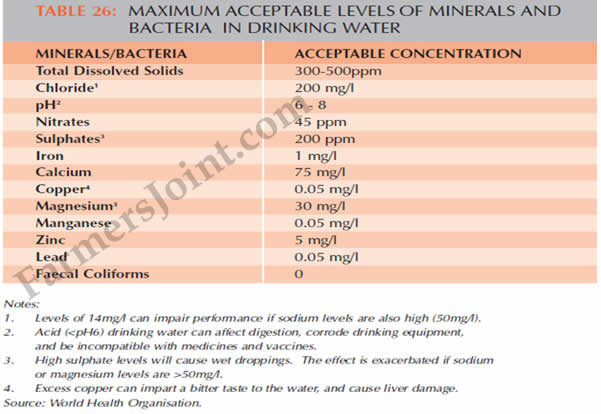Your birds should never lack water (except prior to vaccination). This may sound very obvious but do not overlook it. A simple lack of water for a short time can reduce egg production/growth. Water quality is also important. Ensure that at all times, water should be clean, fresh and cool. Beyond that, the water mineral and bacterial content can affect birds in different ways. We’ll be considering that in a short while.
Birds are fun of muddling their water with dirt and faeces. So use waterers that are designed to keep dirt out or minimize it. Nipple drinkers are the best when it comes to keeping water clean. Wastage & dirt can be minimized in bell drinkers when they are suspended so that the base is at the same height as the birds’ back. Keeping dirt out of the water will minimize the incident of disease infections.
Mineral and Bacteria Levels in Water
The mineral and bacteria levels in the water should be at an acceptable level for birds. The table below shows the maximum acceptable level of mineral and bacteria that should be in the water. You can get this data by carrying out water test at a laboratory close to you.

Source: (3) P.89
Iron Level: High levels of iron (more than 1 mg/litre) may affect drugs like tetracycline and sulfa drugs and may affect the functioning of valves and nipple drinkers. Do you wonder why some drugs seem not to work effectively? Watch out, the culprit might be your water quality!
High levels of iron, calcium and magnesium can all affect drugs and vaccines. If your source of water is high in any of these minerals, adding dried skim milk (2.5 g of skimmed milk powder per litre of water – avoid lumps forming) to the water will neutralize their effect. If you’re not sure of your water quality, you can still add skimmed milk when you want to administer drugs or vaccines.
If the bacteria quality of the water is not ok, sanitize with a suitable water sanitizer like chlorine compounds, iodine etc.
Note: If vaccine or drug is to be added to water, DO NOT sanitize the water. Ignoring this can lead to failed vaccination or failed medication.
Chlorinating Water: 5-8g of bleaching powder is added to 1000 litres of drinking water to maintain a chlorine level of 1-2ppm at delivery.
A minimum contact time of 1hr should be given before offering the water to the birds.
Liquid chlorine like chlorine dioxide, 5% Na hypochlorite (Sanitech) etc. may also be used at a level of 1ml/10lit of water.
Recommended Chemical Characteristics of Water
- pH between 6 and 8
- Hardness: Hard water is not harmful for chickens but it may influence the functioning of the watering equipment. Hard water, coupled with a high sulphate level can cause diarrhoea.

Source: (4)P.26
Works Cited
- Aviagen Limited. Download Ross_Broiler_Manual_09.pdf. Aviagen.com. [Online] Nov. 2002. http://en.aviagen.com/assets/Tech_Center/Ross_Broiler_Manual_09.pdf.
- N. van Eekeren, et al. Downlad AD4.pdf. Journeytoforever.org. [Online] 2006. http://journeytoforever.org/farm_library/AD4.pdf. Agromisa: 90-8573-069-4.
Leave a Reply